7 ways to be Creative
1. Volunteer
2. Circle Diagrams
3. Beachcombing
4. No one comes from nowhere
5. Put everything into everything (But life is not a meritocracy) - Don't be fooled
6. Don't wait to be invited to the dance (But beware the Doppler effect!) - You need to show that you're a creative person and need to crack on with it but not waiting for the opportunity. Do anything you want to, you're own way
7. The day after you finish, what do you do? Think about the future.
www.timclague.com
An Interview with Chucklefish Games
- Game tester that looks at different bugs etc which could improve the game.
Leon Mann
- Interviewer, sports consultant, film maker
- Made first film: 'The Fastest Man Who Ever Lived' (shown on BBC 1, 2 and 3)
Advice
- Seek new information
- Be prepared
- Believe in yourself
- Be YOURSELF
Diversity
- Sports media has a lack of diversity
BCOMS
- Black collective of Media in Sport
- Networking, Mentoring, Lobbying, Support Network
- D Word conferences
Be the Change
- Value diversity
- Challenge respectfully
- Stay true to your own values
Dr Shakuntala Banaji
- Many adult social scientists have written about a crisis of participation and democratic deficit
- Is lack of Trust bad for democracy?
- Increasing control of all media by a few corporations linked to particular political interests
- The economic crisis, vicious spend cuts, economic austerity measures, media narratives of scarcity and nationalism.
- Social cultural, economic and institutional racism
- YOUTH VOICE: There is a common chat about youth inclusion, youth consultation and youth empowerment...
- Inclusion/Exclusion
- mainstream media under-represent and misrepresent youths
Can youth participation be done better online ?
- The internet is really great for people who already have networks! But only using online forums, websites and other social media spaces for information and participation almost completely neglects many groups of youth - possibly even increasing their exclusion from democratic processes .
- Traditional media remain central tools for youth participation in political life; this is especially the case for community/free media.
- Most adults believe that they are in favour of democratic participation - but they don't help young people to participate democratically: for instance, young people t I'm more affluent background can afford to take a year off to volunteer or to assist as an intern on a political party campaign others cannot.
Monday, 30 January 2017
Sunday, 29 January 2017
Post-colonialism
1. Films
- Slumdog Millionaire
- Adulthood
- Star Trek
- Shank
- Ill Manors
TV Programmes
- Dr Who
- The Kumars at No.42
- Goodness Gracious Me
- The Fresh Prince of Bel Air
- Citizen Khan
Only-Only Productions
- Brother's with No Game
- Venus vs Mars
- The Ryan Sisters
- Meet the Adebanjos
- All About The McKenzies
2. I believe that we can link some of Fanon's and Alvarado's theories to the short film Tight Jeans. Linking to Fanon's theory we could use the keyword, 'Essentialize'. I believe that this is a good way to describe the characters as this means that 'they all look the same' and by this, I mean by their appearance. All three characters are wearing these baggy jeans, a hoodie and trainers; This is stereotypical something that a typical young black male would wear on a normal day-to-day basis. Another keyword that could describe the film is 'decivilize', considering that they are sitting near a block of estates which in London, stereo typically shows that this is usually were the usual black male would usually hang around with their friends and would be up to no good. However, in this film, they were just waiting for a friend and just casually talking in a sensible manner, causing no trouble at all. But as an audience, we would think that's what their intentions would be. In addition, from Alvarado's theory, we can talk about the keyword 'humorous'. In the video, the three characters were making these awkward jokes about different ethnicity and were also making jokes about this white male wearing these skinny jeans. This is another stereotype to some extent, as we usually would see black males making movies that were funny to the audience.
In my opinion, I believe that these films do reinforce black stereotypes in British TV. Again, a lot of all the movies believe in the same thing and all of the characters all appear the same (essentialize). For example, they all wear the same clothes as shown in these example movies that we went through in class. On the other hand, sometimes it goes against these stereotypes as shown in the movie 'Gone too far'. This movie was about this man coming from abroad which is in particular parts of London, shows that it is very embarrassing and don't want anything to do with that particular culture.
Tuesday, 24 January 2017
24/01/17 - The real secret of Chinese internet censorship? Distraction John Naughton (40)
https://www.theguardian.com/commentisfree/2017/jan/22/chinese-internet-censorship-uses-distraction
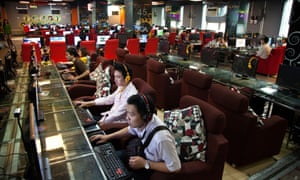

This article is about China is the go to country. It firstly started to talk about how China is one of the only countries which gets the Internet and what it stands for - they know how to control it etc. In addition, it also states that they want to modernise and energise China so that it can fulfil its destiny as a world power. For that, they need it to transform their country into a hyper-networked society. But on the other hand, they do not want democracy, with all its attendant nuisances such as human rights, governments bound by the rule of law, transparency, accountability and the like, and they fear that the internet may give citizens ideas above their station.
- The 50c army does exist, they find, but it’s not a part-time operation and it’s more ingenious than most people thought. King and co estimate that the Chinese government fabricates and posts about 448m social media comments a year. But they also show that the underlying strategy is to avoid arguing with critics of the party and the government and to not even discuss controversial issues.
- There was, however, one aspect of Chinese internet management that King’s study did not touch, namely the widespread belief that, in addition to passive monitoring and censorship, the regime also employed legions of part-time bloggers and social media users (maybe as many as 2 million) to post stuff on the net that was favourable to the government or refuted its critics.
In my opinion, I believe that if the Chinese government were meant to be the most powerful countries, in terms of the new/digital media, there would be mixed feelings about this. The pros about this is that Chinese is one of the most spoke language in the whole world so to communicate as they are solving the many different problems on the Internet, it would be more convenient as many people speak it. However, the downsides would be that the country will change; after all these years, the Internet has been widely dominated by the USA and the U.K, as considering that these are two similar countries e.g. In the language they speak, this can lead to many different problems happening conferring that they are also allies in terms of the countries relationship. Therefore, I believe that if and when China become the most powerful country in the whole, this could cause a lot of different types of problems.
24/01/17 - Snapchat cracks down on risque images and fake news (39)
https://www.theguardian.com/technology/2017/jan/24/snapchat-cracks-down-on-soft-porn-and-fake-news
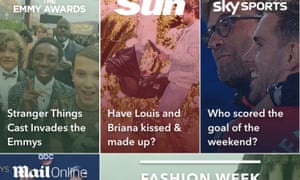

This article is about how Snapchat are now facing difficulties by keeping all of their customers satisfied because of the fact that they show 'soft porn' on their discover section of the app. Some of the audience don't like seeing things as like this because it's either sexist or unappropriate as there may be younger audiences going through the app. Snapchat has faced many different such as lawsuits but now they have been solved by the court and everything is cleared. To prevent this from causing anymore problems to themselves and the audience, they are now working towards making settings where if the audience wishes to view content that is 18+ as mentioned by the Snap spokeswomen to the article. In addition, at first, some people didn't mind seeing soft porn but one day, they 'crossed the line' because they were almost representing women in a discriminating manner and therefore, the audience didn't like that since it was sexist and downgrading to the women society.
- “Usually, I just put up with it, but a few weeks ago, a definite line was crossed”, she said: “The image was of a completely nude female on the top … The picture was taken from the side, so you can’t see the nipples but her breasts were dangling over her boyfriend who she was mounting. She was dressed on the bottom and I believe her boyfriend was completely dressed.”
- Toeing the line between keeping Snapchat age appropriate for younger users – the app bars children from under 13 from making accounts, but allows 13- to 17-year-olds on the service – and allowing publications on Discover editorial freedom has been difficult for the company, particularly when media organisations know one way to appeal to the app’s millennial user base is with prominent use of risqué images.
In my opinion, I believe that what Snapchat are going to be doing to their application is a great idea and is showing that they are very responsible. Considering, that a fraction of their audience do not like the fact that there is soft porn shown on the discovery section of the application and now they are going to do something which will satisfies them makes them seem very responsible. They have seen that they were wrong to some extent and may have hurt some of the users feelings but now they are acting up towards it shows that they are a very good large company and will do anything to satisfy their customers and users by changing the setting and adding new ones so that the users can adjust to their own suitability.
January Assessment: Learner Response
1) WWW - Well structured, clearly expressed + clear focus on the question.
EBI- You should have talked about the mainstream news media more (our case study) and linked it to News of the Tweet etc. Write a paragraph doing this.
2) From the mark scheme, I believe that I had used the following:
EBI- You should have talked about the mainstream news media more (our case study) and linked it to News of the Tweet etc. Write a paragraph doing this.
2) From the mark scheme, I believe that I had used the following:
- Well structured and clearly expressed (Level 3)
- A clear focus on the question (Level 3)
- A clear individual case study, with a range of examples (Level 3)
Despite me thinking that I have met these requirements from Level 3, these are only the basics in my opinion and I believe that there is much more which I can improve on, for example giving more examples on the case studies. I did give a few but I don't believe that it was enough to justify a high level 3 mark.
3) Points I included
- Good answers discussed the different 'value' audiences placed on these sources.
- Good answers discussed the role of audiences in influencing and producing media content and the advantages and disadvantages of this audiences and producers.
- Almost all answers had examples from their case study of competing ideas and opinions. Weaker answers tended to just describe them.
Points I didn't include and could have improved
- Good answers discussed the reasons why there was democracy or not, using media issues, debates and wider contexts.
- Good answers discussed the different ‘value’ audiences placed on these sources. Sophisticated answers discussed how this could change and wasn’t fixed. For example did audiences trust established media organisations or user generated content now? What were the advantages and disadvantages for audiences of the different sources? Did audiences now use a range of sources for different reasons? Could established media organisations lose trust?
- Should've included more theorists, e.g. Briggs and Burke - "the most important medium of the 20th century".
- Comparing my essay to this one, I spoke more towards one side of the story where as in this one, their argument was well balanced.
- Talk about hegemony (society is usually controlled by the elite).
5) LR Paragraph
On the other hand, a pluralist may suggest that the internet isn't always misleading and on some occasion, citizen journalists and bloggers have been extremely useful. A key example of this, where the public and even the government have benefited from, is the Ian Tomlinson case. This is where the police had attacked him as they thought he was a suspect, but he was only a regular civilian walking along the road and then died at the scene. Since the police thought it was filled with many protesters etc, they tried to back themselves up and wrote a false statement saying that he was not innocent and was trouble. However, what they didn't know was that a bypasser on the street was recording the whole thing and uploaded it online showing that the police were wrong since the citizen journalist had the evidence to back themselves up with. So, what the people can learn from this is that even though bloggers and journalists (citizen) are not always professionals, the public can still benefit from them as they may know something which the professional experts may not. Rupert Murdoch said that "The internet has given readers much more power...The world is changing and newspapers have to adapt". This could suggest that the newspaper industry can be hard to top the new/digital media platform as they can give more to the audience such as showing footage to the audience as it is digital where as the newspapers can't have that capability of doing something like that. Therefore, on some occasions they can also be very trustworthy, e.g. to help solve crimes and the online world as a whole can be extremely useful.
Article paragraph
19/12/16 - How TV news failed to keep up in 2016 (30)
Throughout the years, TV news has been extremely popular in terms of the trust, from the audience, and the quality it has gained over the past decade or so. However, TV news is slowly starting to become less popular since the online (new/digital media) is slowly starting to take over the platform of news. Although, the TV news has got a lot of trust from their audience, they believe that what they see on TV can be quicker to access online and therefore, the audience would want to use the online applications etc. However, a Marxist would believe that the internet is can be very unreliable on a lot of things that have been posted. An example of this is fake news. Fake news is highly linked to Keen's theory on how "The internet has become millions of monkey's typing nonsense" and this is true to some extent. With fake news, many things in the public eyes have gone wrong, e.g. Brexit and Trump winning the presidential election. So, the Marxist would suggest that the digital world is ruining our lives as they are constantly feeding us with false information and we don't see it and therefore, we believe everything that we read online. This is why the results such as Brexit has happened, because of the fact a lot of the audience are very 'gullible' as they believe the internet is always right but don't understand anyone can write anything. Therefore, on some occasions the internet is very false and misleading and also very hard to trust at some points.
Article paragraph
19/12/16 - How TV news failed to keep up in 2016 (30)
Throughout the years, TV news has been extremely popular in terms of the trust, from the audience, and the quality it has gained over the past decade or so. However, TV news is slowly starting to become less popular since the online (new/digital media) is slowly starting to take over the platform of news. Although, the TV news has got a lot of trust from their audience, they believe that what they see on TV can be quicker to access online and therefore, the audience would want to use the online applications etc. However, a Marxist would believe that the internet is can be very unreliable on a lot of things that have been posted. An example of this is fake news. Fake news is highly linked to Keen's theory on how "The internet has become millions of monkey's typing nonsense" and this is true to some extent. With fake news, many things in the public eyes have gone wrong, e.g. Brexit and Trump winning the presidential election. So, the Marxist would suggest that the digital world is ruining our lives as they are constantly feeding us with false information and we don't see it and therefore, we believe everything that we read online. This is why the results such as Brexit has happened, because of the fact a lot of the audience are very 'gullible' as they believe the internet is always right but don't understand anyone can write anything. Therefore, on some occasions the internet is very false and misleading and also very hard to trust at some points.
Monday, 16 January 2017
16/01/17 - BBC iPlayer faces complete overhaul in Tony Hall's future-proofing plans (38)
https://www.theguardian.com/media/2017/jan/10/bbc-iplayer-faces-complete-overhaul-in-tony-halls-future-proofing-plans
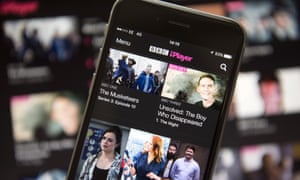

This article is about how the director General Tony Hall is creating a plan on how the BBC iPlayer can become even better than it already is. At the moment, there are many other 'on-demand' industries that are better than the BBC iPlayer with one of them being Netflix's. However, Hall wants to make the BBC iPlayer number one where he is wanting to allow the iPlayer to show more different contents and for a longer period of time. For example, if someone was wanting to watch a BBC soap such as Eastenders online, they can only have access to watch that one specific episode for 30 days unless if the user downloaded it in that period of time. As well as wanting to improve its technology, Hall will say the BBC must do a better job of helping the public understand the news, and ensure its commercial arms, BBC Worldwide and the soon-to-be spun off BBC Studios, contribute to the UK economy.
- Figures from regulator Ofcom published last summer showed that at the end of 2015 iPlayer was used by almost a third of the UK population, ahead of Sky’s TV platform and web-based Netflix, both used by 16%.
- In his speech, Hall will describe the iPlayer as the corporation’s “biggest revolution” of the last 10 years, but said it needed to transform from a catchup service into a “must-visit destination in its own right”.
- Though improving the iPlayer’s technology would help it stay in competition with the US tech firms, it is also facing increased international competition for content. Amazon spent a reported £160m for three series of The Grand Tour, starring the BBC’s former Top Gear team, while Netflix spent a reported £100m for Queen Elizabeth biopic The Crown.
In my opinion, I believe that this idea of wanting to make the BBC iPlayer the number one on-demand industry in the world is very ambitious and hard but would be very beneficial. Hall talks about wanting to make it better than Netflix and the only way I would believe that this can only become better is if they show all of the 'blockbuster' movies that are well recognised to the public audience. However, if they were to do this, there can potentially be many downsides towards this. One of them being the cost of it; the cost can increase massively and therefore, instead of making it better it can make it worse because in September 2015 the BBC said that only TV License audiences can view the iPlayer so therefore, there would be addition payments for the iPlayer and these are some of the things which the BBC would need to keep an eye out on if they are trying to make it better and number 1 in the world. Furthermore, the idea about doing the BBC worldwide is a great idea and everyone can have the access of watching British soaps etc in any country.
16/01/17 - BBC sets up team to debunk fake news (37)
https://www.theguardian.com/media/2017/jan/12/bbc-sets-up-team-to-debunk-fake-news
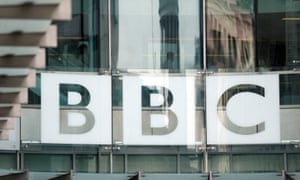

This article is about how the BBC are going out and gathering a team of BBC workers to 'debunk' fake news (find misleading information and delete it straight away). In addition, their news chief James Harding said that the BBC is going to be "weighing in on the battles over lies, distortion and exaggerations". Then he also discussed that the BBC do not have access to edit and change the internet but will do regular check up on the different social media sites they associate with such as Facebook. Furthermore, the writer also included that fake news had a major impact on the UK's referendum about leaving the EU and the presidential elections on how there were numerous amounts of unreliable and made up stories which gave the audience false information and therefore voting for the party, which where they believed more stronger but didn't realise that what they may have voted for can be misleading - all due to the fake news. Therefore, BBC are wanting to make a change in this and making the online/digital world, a place where if the audience were to read something, there wouldn't be any cautions of disbelief on if it was fake news or not. Facebook has been singled out as the platform that has enabled false stories to spread most widely.
- Harding said the corporation had been inundated by news in 2016 because the world was “living in an age of instability”.
- The plans also include establishing an expertise network drawing on staff across the BBC, creating an “intelligence unit” within the World Service, which has received £290m to expand its reach into new languages, and putting more resources into data journalism.
In my opinion, I believe that a huge worldwide company such as BBC trying to make an impact on this fake news scandal is a good thing. One of the reasons I believe this is because of the fact that the BBC are known for being balanced (unbiased) and therefore, they will be able to give a valuable reason on whether or not something is fake news or not. Also, even without telling that they are unbiased I believe that the people who run the internet servers, could potentially take specific articles down with the voice of the larger companies like the BBC. Therefore, I believe that what the BBC are trying to do about the fake news and being one of the first larger companies to try and make such a huge impact on something as quite serious as this, is good as it may also persuade other larger companies to do the same thing, especially companies such as Twitter or Facebook.
Saturday, 14 January 2017
Identities and the Media: Reading the riots
- With the first two articles in this media magazine, they showed the iconic London riots photo of this teenage who had a hoodie and tracksuits on but blacked out his face. The representation that may be shown from this photo is that the majority of these looters were young black males and suggesting that they were the only trouble makers which could be very controversial as a lot would argue that there were other ethnic groups that were apart of this.
- In his books, it points to emergence of a new form of class contempt in Modern Britain. The working class, he argues, has become an object of fear and ridicule. This then shows the difference between the classes (diversion).
- A typical representation of young people, especially teenage boys is that the a lot of them would either be involved in anti-social behaviour and crime. It also states this in other different newspapers and therefore, is creating a negative representation. This is because of the fact that the public would then believe that all teenage boys are involved in crime but do not pay attention to that some people are not like that and are very generous too. The 2005 IPSOS/MORI survey found that 40% of newspaper articles featuring young people focused on violence, crime or anti-social behaviour; and that 71% could be described as having a negative tone.
- Cohen's work on Moral Panic can strongly be linked to the coverage of the riots in the sense of teenage boys. Since the newspapers have come out saying that the majority of teenage boys are 'trouble makers', the public will then make the moral panic of whenever they would see a teenage boy, they would always believe that they are going to be up to no good etc.
- Media platforms such as social media sites have had a huge impact in the riots. For example, social media sites such as Facebook and Twitter allowed the different users to make social media groups where the users can interact privately and therefore organise when they wanted to loot. What time? What day? etc... Therefore, the social media sites are being blamed because they have the power of shutting down the group chats as they have the access to day anything but they didn't and people believe that this could've helped prevent the riots massively from happening. A very similar argument was used in media debates about the ‘Arab spring’ earlier this year: there was much discussion about the use of social networking in the revolutions that took place in countries such as Tunisia, Egypt and Syria – although in those instances, this was generally interpreted by the Western media as a positive things.
- Some media scholars like Henry Jenkins tend to celebrate these kinds of ‘participatory’ media; while some even see this as evidence of a wholesale democratisation of the communications system. They argue that the age of ‘Big Media’ – of powerful, centralised corporations controlling media – is now finished: hierarchical, top-down communications have been replaced by a more egalitarian approach. Personally, I believe that everyone is entitled to their own opinion and how they view the social media sites.
- The right wing responses to the riots was that the young children, especially the young black people, didn't have good upbringing or either weren't told properly from right and wrong and therefore, they had a huge lack of discipline, which meant that they were able to do anything freely etc.
- Throughout that period of time, the younger audience were not give what they wanted, e.g. jobs etc and therefore, they were already angry with the government. Then, when the police officers shot Mark Duggan, then it 'pulled the trigger' and therefore, the youths wants to get the government and everyone back because they believed that the youths were a joke and didn't believe in their potential of doing great things.
- Some media scholars like Henry Jenkins tend to celebrate these kinds of ‘participatory’ media; while some even see this as evidence of a wholesale democratisation of the communications system. They argue that the age of ‘Big Media’ – of powerful, centralised corporations controlling media – is now finished: hierarchical, top-down communications have been replaced by a more egalitarian approach. Personally, I believe that everyone is entitled to their own opinion and how they view the social media sites.
- The right wing responses to the riots was that the young children, especially the young black people, didn't have good upbringing or either weren't told properly from right and wrong and therefore, they had a huge lack of discipline, which meant that they were able to do anything freely etc.
- Such commentators point out that the UK has one of highest levels of inequality in the Western world. They argue that it was unsurprising that most of the disturbances erupted in areas with high levels of poverty and deprivation
- Throughout that period of time, the younger audience were not give what they wanted, e.g. jobs etc and therefore, they were already angry with the government. Then, when the police officers shot Mark Duggan, then it 'pulled the trigger' and therefore, the youths wants to get the government and everyone back because they believed that the youths were a joke and didn't believe in their potential of doing great things.
- I believe that the people weren't given a chance to speak in the media and when they did, no one would care or listen to what they said and therefore, led to the riots happening. Therefore, I think that the government and all the upper class people were almost asking for the trouble to happen.
- In the Guardian website's investigation into the causes of the riots, they did interview rioters themselves. Read this Guardian article from their Reading the Riots academic research project - what causes are outlined by those involved in the disturbances?
- In the Guardian website's investigation into the causes of the riots, they did interview rioters themselves. Read this Guardian article from their Reading the Riots academic research project - what causes are outlined by those involved in the disturbances?
- Gang involvement
- Social media to use the group chat section to plan the riots
- Goods that weren't affordable for the public youths.
Tuesday, 10 January 2017
10/01/17 - Film and TV streaming and downloads overtake DVD sales for first time (36)
https://www.theguardian.com/media/2017/jan/05/film-and-tv-streaming-and-downloads-overtake-dvd-sales-for-first-time-netflix-amazon-uk


This article is about how the Film and TV streaming online has overtaken DVD sales for the first time. It firstly talks about how 'Britain’s growing appetite for services such as Netflix and Amazon has helped push streaming and downloads of films and TV shows ahead of sales of DVDs and Blu-ray discs for the first time'. Netflix has rapidly grown to 6 million UK subscribers since launching in 2012 and also with the new induction of 'Sky Store', Sky had more than 3 million customers to its Sky Store in the year to the end of June, where the customers would download films and get different DVD's posted to them which is very similar to Netflix when their company had first started.
- Total revenues from digital video – which includes services such as Apple’s iTunes as well as Sky’s store and Now TV – surged almost 23% to £1.3bn last year.
- The digital boost came as high street sales of DVDs and Blu-ray discs fell 17% to £894m – the first time it has fallen below the £1bn mark. The once mighty physical rental market fell 21% to just £49m.
- Total revenue from physical and digital sales rose 2.2% to £2.25bn, with the biggest seller of the year Star Wars: The Force Awakens with sales of 2.3m .
- Despite the digital revolution, Bayley said that it was too soon to ring the death knell of the DVD, with physical sales of music, TV shows, films and computer games still worth £2.2bn annually.
- Physical sales of CDs fell by 13%, a steep decline after a 3.7% fall in 2015.
- Overall physical sales were 7.3% down as a surge in vinyl sales, up by 56% to £65.6m, helped stabilise the decline.
In my opinion, I believe that the decline in DVD and up rise in on demand activites is beneficial for the audience but not for the companies as they aren't making as that many sales and losing customers. However, this is good for the audience as they wouldn't need to pay that much. For example, if a customer were to buy a DVD a long time ago from a rental company such as Blockbusters, they would most likely be spending £5 to rent the movie for 5 days. But since the industry have now introduced Netflix to the online/digital world, audiences can spend around £6 a month and watch as many movies as long as they would like to. This allows the audience to save money and will rise the industry of the digital world massively because it would be beneficial for the new companies and the audience, as referenced before.
10/01/17 - Snapchat to set up main international hub in UK (35)
https://www.theguardian.com/technology/2017/jan/10/snapchat-snap-inc-international-hub-uk
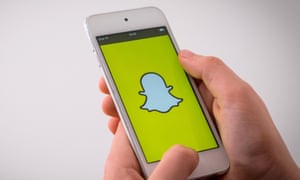

This article is about how Snapchat are going to 'set up its main international hub in the UK' since they believe that Britain are a strong creative industrial nation, even more in favour than the United States in their opinion. It also states how there are many doubts from other smaller industries within Britain due to them still having to leave the EU, but the 'larger firms' such as Facebook and Google still believe that they can still do more investing if they were to remain committed to Britain. In addition, they also talk about how the HUB they're going to introduce is going to really beneficial to their Snap Spectacles which was their second product ever to be made by the companies (after the application, Snapchat). They believe that more people will slowly start to be more aware despite them not having released this product in every single country that Snapchat is accessible to, but believe to be waiting for the right moment. Even though Snapchat is to be seen as a smaller industry to companies such as Google, they believe that the section they are working on can be a massive hit.
- Those numbers add up: research firm eMarketer estimates the company could pull in almost $1bn advertising revenue over 2017.
- With a stated user base of over 150m, Snapchat is smaller than seeming competitors like Facebook and Twitter, with a billion and 350 million users respectively.
- The company says more than 60% of British smartphone users aged between 13 and 34 are Snapchatters.
Personally, I believe that the Snapchat glasses have got many hazards towards it especially since the majority of their audience are very young and may not have a clue of some particular things. For example, if they are walking along the street and using the glasses at the same time, there could be a chance that when they're crossing their road, there may be a car which they didn't see and therefore could be involved in a accident. On the other hand, I also believe that this can be a good thing. Since Snapchat is also around to educate people by the discover section, this product can be used to encourage them to buy it and use them for the things that are what they're made for, e.g. recording their recent activities but also to read different news articles.
Wednesday, 4 January 2017
02/01/17 - Smartphones are stealing our time. This new year, I want to claim it back (34)
https://www.theguardian.com/commentisfree/2016/dec/29/smartphones-time-new-year-apps-resolution-facebook

This article firstly, started off with a scenario of which the writer said the following: I sit with a friend having some seasonal drinks. The second she gets up to go to the toilet, I catch myself reaching for my smartphone. But instead of taking it out and idly filling the two minutes she’s gone, I flip the switch on the side to silent and look around the room instead. I’m practicing for 2017. The writer and a lot of other people believe that smartphones are taking too much time of ours when we could be getting on with something more productive rather than searching through what is going on with our friends. In addition, the writer also goes on to talk about how the people that lived hundereds of years ago and have the same lifestyle as what we have now, they would be terrified with this culture considering back then, people would only have access to news through word of mouth or either newspapers but that would take weeks to arrive.

This article firstly, started off with a scenario of which the writer said the following: I sit with a friend having some seasonal drinks. The second she gets up to go to the toilet, I catch myself reaching for my smartphone. But instead of taking it out and idly filling the two minutes she’s gone, I flip the switch on the side to silent and look around the room instead. I’m practicing for 2017. The writer and a lot of other people believe that smartphones are taking too much time of ours when we could be getting on with something more productive rather than searching through what is going on with our friends. In addition, the writer also goes on to talk about how the people that lived hundereds of years ago and have the same lifestyle as what we have now, they would be terrified with this culture considering back then, people would only have access to news through word of mouth or either newspapers but that would take weeks to arrive.
- On average, smartphone owners use them for over three hours per day.
- From worrying reports of smartphone addiction, to the identification of smartphone faux-pas such as “phubbing”.
- It is in this context that we should understand the pathology of smartphones. Next time you look around a train carriage and can count into double digits the people staring at their smartphones, remember that above all these devices are used as instruments of distraction.
In my opinion, I believe that the title of this topic is a thing; everywhere we go, we will always see the majority of people on the streets using their smartphones for social media uses. A lot of the time, people would use their smartphones only to waste their time and wouldn't want to be doing anything that may be productive or very beneficial to them. So, to conclude, I don't believe that this can be solved because nowadays, we have been bought up in a society now where using smartphones have now become a normal thing and no one bothers with taking notice of it considering 'everyone who has a smartphone and has got nothing to do, will also be roaming around on it'. Therefore, I believe that this cannot be changed and is only the beginning.
02/01/17 - Change never stops, but we will always need journalism (33)
https://www.theguardian.com/media/2017/jan/01/we-always-need-journalism-but-change-never-stops


This article started off talking about the trouble as 2017 begins is simplicity, as in simple cause and effect. Fifteen years ago, Britain devoured around 15m newspapers each morning. Now it’s 6m and falling. A big cause of this is that the majority of these previous newspaper users, have now moved onto social media and use their smartphones for news with the greater impact in new/digital media. It also says the following: One habit dies; another takes over. That’s an obvious tale of cause and effect, a conclusion that broadcasters who don’t much appreciate the printed press find an easy recitation. One habit falls, another takes over. An equation so basic you don’t really have to think about it – nor try to set it in any historical context. But look back awhile before you look forward. For looking forward means looking back. The point about looking back is that this unwinding chronicle never ends, never finds a steady state. There’s a whole new world beyond Facebook and Google out there – and only one certainty firm in the mix. However produced, however delivered, this swirling world needs facts, perceptions, arguments, reflections, hard truths. This world needs journalism.
- There was, as it transpired, too much free news material out there you didn’t have to pay for. To this day, only about 10% of news on the net comes with a price tag.
- You could feel that print nirvana coming in the late 1980s and through the 1990s. New papers, new supplements, new thicker editions, the transforming wonders of colour.
In my opinion, I believe that the title of this article is 100% accurate. In the media, there will always be changes but we will always need journalists as they are the most reliable piece of sources the news platform have. Without them, this can then see a giant increase in the result of fake news happening more frequently. This can result in more bloggers coming at the forefront since there will be no journalists and therefore could be a chance that the news provided by those specific blogger, means that they will most likely not fully reliable and accurate and everyone would be feeding themselves with inaccurate information.
27/12/16 - Calls to Childline about online sexual abuse up 250% in three years (32)
https://www.theguardian.com/society/2016/dec/26/calls-to-childline-about-online-sexual-abuse-up-250-in-three-years


This article is talking about the rise in online sex abusing within the younger society and the key question which this article is talking about is that whether or not 'Their parents should give them a phone or tablet for their own personal use?' The article talks about how the children who had felted ashamed with themselves, would call Child Line and talk to advisers/helpers there on what to do. In addition, the article also talks about the advice it may give the parents: Advice for parents includes exploring sites and apps alongside their children, asking about things children might see that make them feel uncomfortable, and promising not to overreact.
- Over the past three years, the number of contacts to Childline about online sexual abuse has surged by 250%.
- The NSPCC said there were 3,716 Childline counselling sessions about the issue in 2015-16 – a 24% increase on the previous year’s 2,994.
- “In the last year we’ve seen a staggering rise in online sexual abuse, with many children turning to Childline when the situation has escalated.”
In my opinion, I believe that the parents should only give their younger children phones where they can only have the access of only making calls. The benefits of this is that they will know that their children are most likely safe as they wouldn't be forced to send photos to random people they don't even know. The benefits of the younger children not having a smartphone means that this will less likely decrease the calls towards childline and will also be able to carry on with their lives without any discomfort and threatening from anyone.
Tuesday, 3 January 2017
27/12/16 - Do I need to get Snapchat? And would you please explain it to me? (31)
https://www.theguardian.com/media/2016/dec/26/do-i-need-to-get-snapchat-and-would-you-please-explain-it-to-me


This article is about the social media site, Snapchat. At some points, the writer of this article is making negative comments about it as he believes that the majority of the young users use snapchat too frequently to make daily updates on what is going on in their lives. He also states how it takes up too much memory and how everyone should just stick to Facebook as it is more of a simple social media site to use. A lot of people would not know this, but snapchat was originally made for the 30+ age group but turned out that more of the teenagers would use it. This is because of the fact that, younger audiences will frequently be accessing their smartphones as they only have school 6 hours a day and the fact their parents would be too busy cleaning, cooking and working. In addition, the writer also talks about the main things which Snapchat lets the audience to do: Snapchat’s point of difference is that its pictures and videos are visible for a maximum of 10 seconds, then disappear. Over the past 18 months, new features have been added, such as stickers and animated lenses to jazz up your selfies that doubtless brought enormous cheer to those around you this Christmas.
- According to the company’s own figures, more than 150 million people use the app every day, including 41% of 18- to 34-year-old Americans, the coveted millennial market.
- Three years ago its 27-year-old co-founder, Evan Spiegel, refused an offer of US$3bn from Facebook. Today Snapchat is reportedly worth as much as US$25bn (making it a “mega unicorn” of the likes of Uber and Airbnb) – and Spiegel is engaged to Miranda Kerr.
- Go easy with the selfies, too. The lenses are good fun and quite remarkably flattering but, in 18 months of use, they have become loaded. The flower crown and the puppy dog ears, in particular, are now seen as cliche, even “basic”. Apply sparingly.
In my opinion, I believe that the writer of this article is talking very negatively about Snapchat and how that everyone is using this everyday, especially the younger audience. Since I am one of those audiences that would usually keep upto date with the people I am following on Snapchat, I therefore believe that this is a good thing since you get to know what is going on in peoples lives. Also, on one section of snapchat, there is a place where there are frequent news updates, therefore this means that not only are Snapchat allowing their users to talk to others via the app, but the audience also have got the option to go onto the news articles and keep updated with the news around the world.
19/12/16 - How TV news failed to keep up in 2016 (30)
https://www.theguardian.com/tv-and-radio/2016/dec/19/how-tv-news-failed-to-keep-up-in-2016
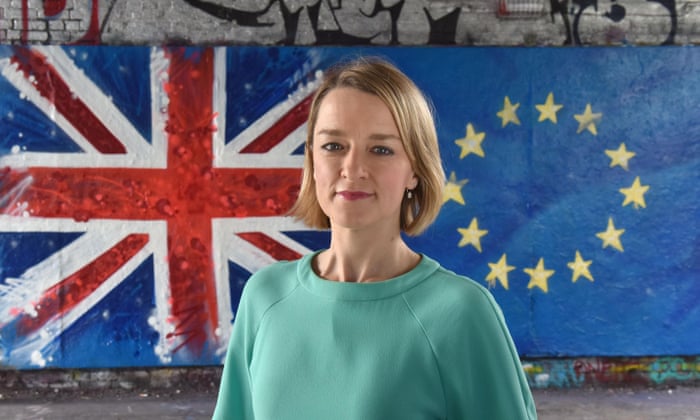

This article is mainly talking about the impact in which social media has had on the news. Nowadays, people are more likely to be using social media for their sources of news rather than going onto the TV for the news. The writer also discuss how news on TV is harder to come across rather than on social media sites since on the social media sites, it will be what the readers would find appealing to them and not having to wait for the TV news presenter to get onto the news which may fascinate the audience. In addition, he also gives the facts about how the majority of the teenagers would use the social media sites and how Oxford Students would use the TV news to research the pros and cons between each platform. In addition, linking back to this, the writer talks about how social media has got the edge since it is a much more easier and quicker service as the TV news is much more harder to be focused on.
- Of the 18- to 24-year-olds surveyed by the Reuters Institute for the Study of Journalism, 28% cited social media as their main news source, compared with 24% for TV.
- TV news audiences are in freefall (in the UK, they’ve declined by 3% to 4% a year on average since 2012).
- t was not until a month after the country voted for Brexit that the BBC political editor, Laura Kuenssberg, showed – in her documentary Brexit: The Battle for Britain – that the leave campaign’s claim that £350m a week of British taxpayers’ money went to Brussels was a house of cards that a single puff would flatten.
In my opinion, I believe in what the writer is saying about how the social media sites are the new way and oncoming way in which the audience will want to receive their news. The reason for this is simply because of the fact it is much more easier than having to go onto the TV since your phone or tablet will always be right in front of you. However, I still believe that TV news is extremely important since this is something which keeps the reliable journalists at their jobs and without them, there would hardly be any news which will be covered and if there wasn't any journalists, then this would be the stories about 'fake news' even more popular than it is now. Therefore, I believe that the audience whom only read their news online (on social media sites) should still make the effort to go onto the TV and watch the broadcast news 'once in a while'.
19/12/16 - In a world of fake news, real journalism must be paid for (29)
https://www.theguardian.com/commentisfree/2016/dec/16/fake-news-journalism-digital


This article, firstly starts off with a strong opening saying the following: "the news has itself become the news." It also went on to talk about how important 'real journalists' are to the real world and that without them, fake news will never be solved and how in which everyone will be mislead as everyone will believe that this 'fake news' is real. In addition, the article also discusses what the audience themselves believe; they believe that the fake news should be removed from the internet instantly, which would then result in less people viewing it and the word wouldn't spread to a lot of people. However, after this statement, the article then discusses how these actions would be extremely difficult as it would be hard to pick out whether the certain information someone has put up, e.g. onto a social media site, is fake news or not.
- There’s the question of the so-called “filter bubble”, the fear that citizens who rely solely on them for news and opinion live in what TS Eliot once called a “wilderness of mirrors”, only exposed to perspectives like their own.
- There are obvious incentives for unscrupulous politicians to spread fake news – it’s a way of viciously attacking opponents while retaining deniability and pretending only to be encouraging a “debate”.
- If you as a citizen are worried about fake news, put your money where your mouth is and pay for the real thing.
In my opinion, I believe that the fake news issue is starting to become very serious now and we should do something from preventing this from happening even further. Having said that, the article has clearly stated the main reason why it may be extremely difficult to prevent this from happening; It would clearly take a long time, first of all, to find out if a specific statement is false and therefore, would need to act upon it with whoever else may have spread the word around. Linking back to the last bullet point, I believe that the writer of this article mad a good point about this. If people are so worried that they may be reading fake news and don't want to, then they should seriously consider paying for their news as it would be 100% reliable, as it would then be backed up by journalists who get paid to find out this information.
Subscribe to:
Comments (Atom)